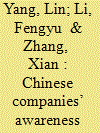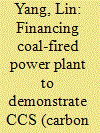| Srl | Item |
| 1 |
ID:
149890


|
|
|
|
|
| Summary/Abstract |
China announced the launch of a national Emissions Trading Scheme (ETS) in 2017; however, companies appear show little enthusiasm for participation in the ETS in China. This paper identifies the factors affecting companies’ awareness and perceptions of ETS by conducting a national survey based on an online questionnaire from May to November 2015 in seven carbon trading pilots. The results indicate that companies’ attitudes towards the ETS are positively influenced by government regulations and policy, public relations management and estimated economic benefit. Of these, public relations management is the decisive factor and estimated economic benefit is confirmed to be a relatively weak predictor. A company's environmental and energy strategy exerts insignificant effects on its preference for the ETS, although the sampled companies are very willing to save energy and reduce emissions. There exists an inverted U-shape relationship between a company's level of mitigation technologies and its attitudes towards the ETS. The carbon price fails to stimulate companies to upgrade mitigation technologies. The majority of companies treat participation in the ETS only as a means of improving ties with governments, as well as of earning a good social reputation, rather than as a cost-effective mechanism to mitigate greenhouse gas emissions.
|
|
|
|
|
|
|
|
|
|
|
|
|
|
|
|
| 2 |
ID:
181433


|
|
|
|
|
| Summary/Abstract |
Traditional policy incentives for carbon capture and storage (CCS) mainly rely on fiscal subsidies, which tend to put an inordinate strain on public finances. This study attempts to explore a non-fiscal incentive policy, granting a time extension (extra electricity quota), to finance early CCS demonstration projects in China. We find that coal-fired power plant (CFPP) operate at a loss even without CCS retrofitting under the current electricity quota (4000 h per year), while it can make profits with CCS retrofitting if extra electricity quotas are provided. Specifically, the electricity quota needs to be roughly 4709–7260 h per year with the CO2 capture level ranging from 0.1 to 1 Mt per year in the demonstration stage. In particular, the levelized cost of electricity (LCOE) of CFPP with a capture level of 1 Mt per year is estimated at 298.8 CNY/MWh if the electricity quota reaches 7000 h per year, which is approximately equal to that of CFPP without CCS retrofitting and extra electricity quota (292.2 CNY/MWh). Thus, the extra electricity quota can be considered as an economically feasible policy incentive, and related results are able to provide useful information for electric power enterprises and government decision-makers.
|
|
|
|
|
|
|
|
|
|
|
|
|
|
|
|